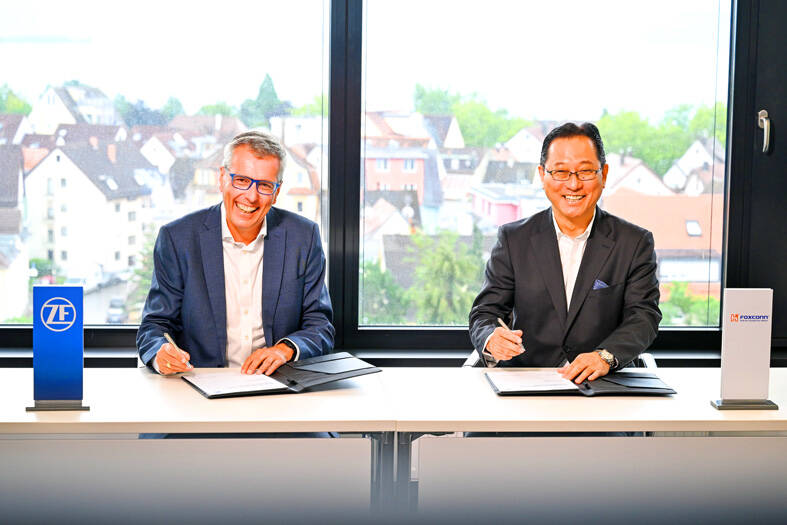Hon Hai Technology Group (鴻海科技集團) plans to acquire a 50 percent stake in a ZF Friedrichshafen AG car axle system assembly unit as the Taiwanese conglomerate seeks to accelerate its diversification into the top-tier automotive supply chain.
The strategic investment, which could cost up to 560 million euros (US$620 million), would deepen Ho Hai’s partnership with ZF Friedrichshafen, also known as ZF Group, which is the world’s third-largest tier-1 automotive supplier, the tech firm said yesterday.
Hon Hai, also known as Foxconn Technology Group (富士康科技集團) internationally, said the deal is expected to be closed in six to nine months.

Photo courtesy of Hon Hai Precision Industry Co
ZF Chassis Modules GmbH is the world’s biggest car axle maker, commanding a 26 percent share of the world’s car axle market, which was valued at 16 billion euros in 2021.
The company has an enterprise value of about 1 billion euros, and counts Mercedes-Benz Group, BMW AG and Stellantis NV as its top three customers, the companies said in a joint statement.
The partnership would leverage both firm’s capabilities and expand the range of product offerings in both the internal combustion engine and electric vehicle space, the statement said.
“We are also keen to explore more partnership opportunities with the ZF Group in the broader transportation and mobility space,” Hon Hai chairman Young Liu (劉揚偉) said in the statement.
ZF Chassis, serving global premium and volume car manufacturers, is represented at 25 locations worldwide. It has approximately 3,300 employees, of which 100 are in Germany.
The unit’s sales are expected to exceed 4 billion euros this year.
“With Foxconn, we have gained a strong strategic partner with whom we can open up new perspectives and opportunities for the ZF Chassis Modules GmbH,” ZF Group CEO Holger Klein said in the statement.

SEEKING CLARITY: Washington should not adopt measures that create uncertainties for ‘existing semiconductor investments,’ TSMC said referring to its US$165 billion in the US Taiwan Semiconductor Manufacturing Co (TSMC, 台積電) told the US that any future tariffs on Taiwanese semiconductors could reduce demand for chips and derail its pledge to increase its investment in Arizona. “New import restrictions could jeopardize current US leadership in the competitive technology industry and create uncertainties for many committed semiconductor capital projects in the US, including TSMC Arizona’s significant investment plan in Phoenix,” the chipmaker wrote in a letter to the US Department of Commerce. TSMC issued the warning in response to a solicitation for comments by the department on a possible tariff on semiconductor imports by US President Donald Trump’s

The government has launched a three-pronged strategy to attract local and international talent, aiming to position Taiwan as a new global hub following Nvidia Corp’s announcement that it has chosen Taipei as the site of its Taiwan headquarters. Nvidia cofounder and CEO Jensen Huang (黃仁勳) on Monday last week announced during his keynote speech at the Computex trade show in Taipei that the Nvidia Constellation, the company’s planned Taiwan headquarters, would be located in the Beitou-Shilin Technology Park (北投士林科技園區) in Taipei. Huang’s decision to establish a base in Taiwan is “primarily due to Taiwan’s talent pool and its strength in the semiconductor

An earnings report from semiconductor giant and artificial intelligence (AI) bellwether Nvidia Corp takes center stage for Wall Street this week, as stocks hit a speed bump of worries over US federal deficits driving up Treasury yields. US equities pulled back last week after a torrid rally, as investors turned their attention to tax and spending legislation poised to swell the US government’s US$36 trillion in debt. Long-dated US Treasury yields rose amid the fiscal worries, with the 30-year yield topping 5 percent and hitting its highest level since late 2023. Stocks were dealt another blow on Friday when US President Donald

UNCERTAINTY: Investors remain worried that trade negotiations with Washington could go poorly, given Trump’s inconsistency on tariffs in his second term, experts said The consumer confidence index this month fell for a ninth consecutive month to its lowest level in 13 months, as global trade uncertainties and tariff risks cloud Taiwan’s economic outlook, a survey released yesterday by National Central University found. The biggest decline came from the timing for stock investments, which plunged 11.82 points to 26.82, underscoring bleak investor confidence, it said. “Although the TAIEX reclaimed the 21,000-point mark after the US and China agreed to bury the hatchet for 90 days, investors remain worried that the situation would turn sour later,” said Dachrahn Wu (吳大任), director of the university’s Research Center for